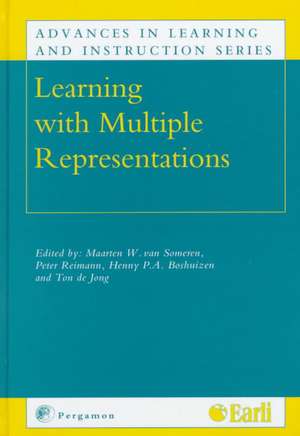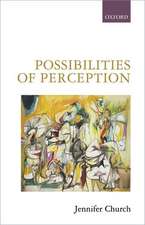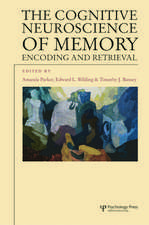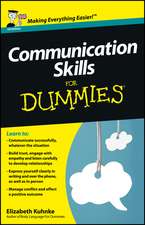Learning with Multiple Representations
Autor M.w. Van Someren, Peter Reimann, Henny P.a. Boshuizen, Ton de Jongen Limba Engleză Hardback – 15 dec 1998
The first aim of this book is to give an overview of the state of the art of the topic of learning involving different representations in the form of overview chapters. The book covers approaches to this topic from different perspectives: educational, cognitive modelling and machine learning. It includes both theoretical analyses and studies in application contexts. The second aim of the book is to present current research on these topics and to articulate research issues for future research. This is done in the form of a collection of research papers and two reflective chapters.
Preț: 928.35 lei
Preț vechi: 1205.65 lei
-23% Nou
Puncte Express: 1393
Preț estimativ în valută:
177.65€ • 186.32$ • 147.88£
177.65€ • 186.32$ • 147.88£
Carte tipărită la comandă
Livrare economică 01-15 aprilie
Preluare comenzi: 021 569.72.76
Specificații
ISBN-13: 9780080433431
ISBN-10: 008043343X
Pagini: 376
Dimensiuni: 174 x 239 x 27 mm
Greutate: 0.7 kg
Editura: Emerald Publishing
ISBN-10: 008043343X
Pagini: 376
Dimensiuni: 174 x 239 x 27 mm
Greutate: 0.7 kg
Editura: Emerald Publishing
Cuprins
Introduction (M.W. van Someren et al.). Multiple Representations in Learning Concepts from Physics and Mathematics. Acquiring knowledge in science and mathematics: the use of multiple representations in technology-based learning environments (T. de Jong et al.). Reasoning with multiple representations when acquiring the particulate model of matter (M. Rohr, P. Reinmann). How beginning students use graphs of motion (E. Scanlon). Toward decision support for multiple representations in teaching early logic (M. Dobson). The role of prior qualitative knowledge in inductive learning (M.W. van Someren, H. Tabbers). Analysing the costs and benefits of multi-representational learning environments (S.E. Ainsworth et al.). Problem Solving and Learning with Multiple Representations. Problem solving with multiple representations by multiple and single agents: an analysis of the issues involved (H.P.A. Boshuizen, H.J.M. (Tabachneck-) Schijf). Accidentology: an example of problem solving by multiple agents with multiple representations (L. Alpay et al.). Perspective-taking between medical doctors and nurses: a study of multiple representations of different experts with common tasks (R. Bromme, M. Nückles). One person, multiple representations: an analysis of a simple, realistic multiple representation learning task (H.J.M. (Tabachneck-) Schijf, H.A. Simon). Using multiple representations in medicine: how students struggle with them (H.P.A. Boshuizen, M.W.J. van de Wiel). Competence-related differences in problem representations: a study in physics problem solving (E.R. Savelsbergh et al.). A utility-based approach to speedup learning with multiple representations (M.W. van Someren et al.). General Issues and Implications for Education. Multiple representations and their implications for learning (A. Lesgold). Representation and conceptualisation in educational communication (K. Stenning).
Recenzii
Arthur B. Markman, Department of Psychology, University of Texas
...the volume explores a wide range of important topics that deal with multiple representations, and thus provides a nice introduction to research in this area. This strength must be emphasized, as the coordination of multiple representations is topic that has not received as much attention in cognitive science as it deserves....the book will be of value for researchers who are already well-versed in general issues of representation and are interested in the state of the art in research on the role of multiple representations in education and expert performance....it is clear that expert performance requires the coordination of multiple representations and that the education of future expert performance requires the coordination of multiple representations and that the education of future experts will require understanding of how to teach people to carry out this coordination. There is clearly a gap that must be bridged between current educational systems, in which the use of multiple external representations may actually hamper learning, and expert performance, which is characterised by the ability to shift among different internal representations of a situation. This book will be a valuable resource for psychologists (and educational psychologists) who are interested in these issues.
British Journal of Educational Psychology, Vol 70, Part 1
...the volume explores a wide range of important topics that deal with multiple representations, and thus provides a nice introduction to research in this area. This strength must be emphasized, as the coordination of multiple representations is topic that has not received as much attention in cognitive science as it deserves....the book will be of value for researchers who are already well-versed in general issues of representation and are interested in the state of the art in research on the role of multiple representations in education and expert performance....it is clear that expert performance requires the coordination of multiple representations and that the education of future expert performance requires the coordination of multiple representations and that the education of future experts will require understanding of how to teach people to carry out this coordination. There is clearly a gap that must be bridged between current educational systems, in which the use of multiple external representations may actually hamper learning, and expert performance, which is characterised by the ability to shift among different internal representations of a situation. This book will be a valuable resource for psychologists (and educational psychologists) who are interested in these issues.
British Journal of Educational Psychology, Vol 70, Part 1















